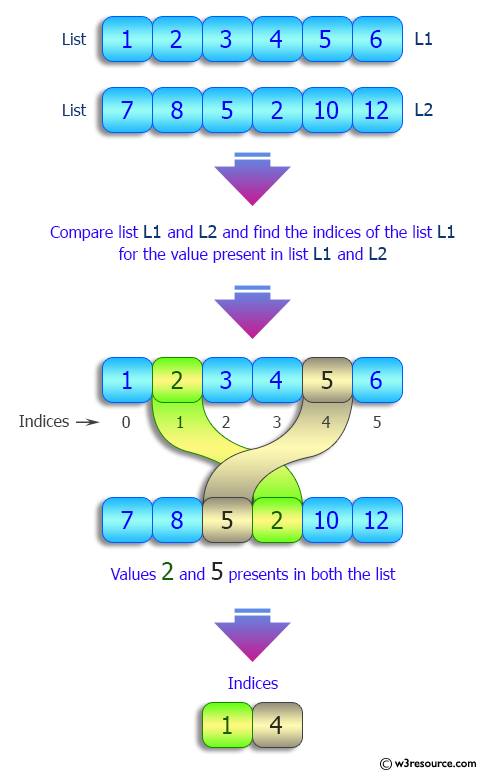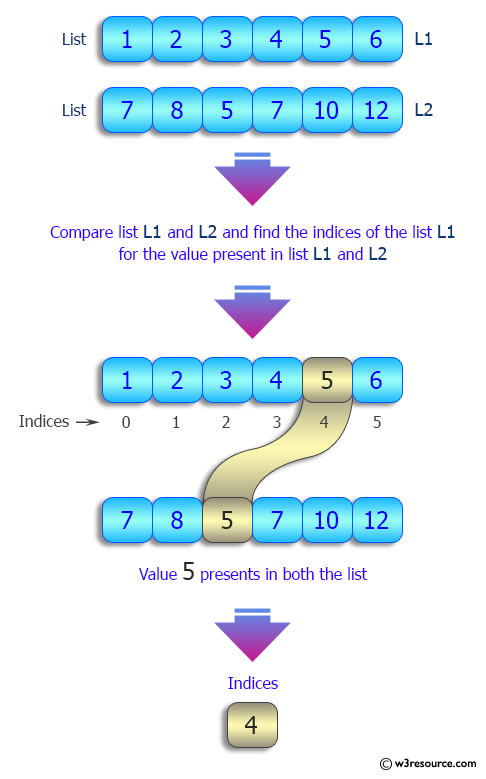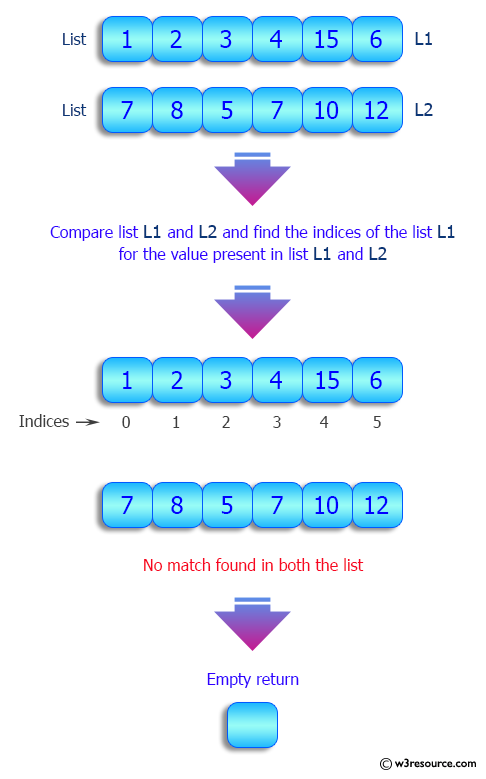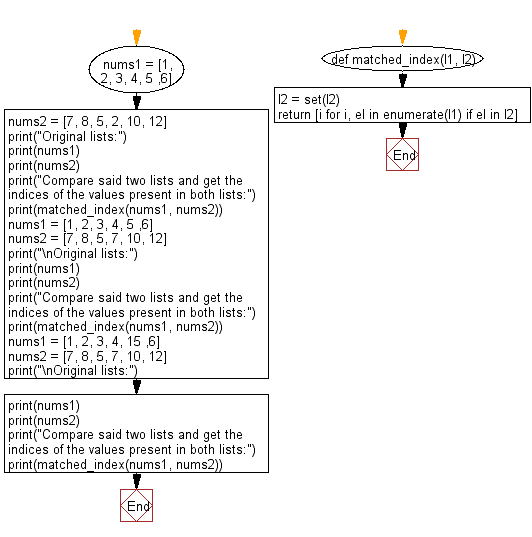Python: Compare two given lists and find the indices of the values present in both lists
Indices of Common Elements in Lists
Write a Python program to compare two given lists and find the indices of the values present in both lists.
Pictorial Presentation:



Sample Solution:
Python Code:
# Define a function 'matched_index' that finds the indices of values in 'l1' that are also present in 'l2'.
def matched_index(l1, l2):
# Convert 'l2' into a set for faster membership checking.
l2 = set(l2)
# Use list comprehension to find the indices of elements in 'l1' that are also in 'l2'.
return [i for i, el in enumerate(l1) if el in l2]
# Create two lists 'nums1' and 'nums2'.
nums1 = [1, 2, 3, 4, 5, 6]
nums2 = [7, 8, 5, 2, 10, 12]
# Print a message indicating the original lists.
print("Original lists:")
# Print both 'nums1' and 'nums2'.
print(nums1)
print(nums2)
# Print a message indicating the purpose of the following line of code.
print("Compare said two lists and get the indices of the values present in both lists:")
# Call the 'matched_index' function to find the indices of values present in both 'nums1' and 'nums2'.
print(matched_index(nums1, nums2))
# Update 'nums1' and 'nums2' with new values.
nums1 = [1, 2, 3, 4, 5, 6]
nums2 = [7, 8, 5, 7, 10, 12]
# Print a message indicating the updated original lists.
print("\nOriginal lists:")
# Print both updated 'nums1' and 'nums2'.
print(nums1)
print(nums2)
# Print a message indicating the purpose of the following line of code.
print("Compare said two lists and get the indices of the values present in both lists:")
# Call the 'matched_index' function to find the indices of values present in both updated 'nums1' and 'nums2'.
print(matched_index(nums1, nums2))
# Update 'nums1' and 'nums2' with different values.
nums1 = [1, 2, 3, 4, 15, 6]
nums2 = [7, 8, 5, 7, 10, 12]
# Print a message indicating the updated original lists.
print("\nOriginal lists:")
# Print both updated 'nums1' and 'nums2'.
print(nums1)
print(nums2)
# Print a message indicating the purpose of the following line of code.
print("Compare said two lists and get the indices of the values present in both lists:")
# Call the 'matched_index' function to find the indices of values present in both updated 'nums1' and 'nums2'.
print(matched_index(nums1, nums2))
Sample Output:
Original lists: [1, 2, 3, 4, 5, 6] [7, 8, 5, 2, 10, 12] Compare said two lists and get the indices of the values present in both lists: [1, 4] Original lists: [1, 2, 3, 4, 5, 6] [7, 8, 5, 7, 10, 12] Compare said two lists and get the indices of the values present in both lists: [4] Original lists: [1, 2, 3, 4, 15, 6] [7, 8, 5, 7, 10, 12] Compare said two lists and get the indices of the values present in both lists: []
Flowchart:

For more Practice: Solve these Related Problems:
- Write a Python program to find the indices of common elements between two lists, excluding elements that occur only once in either list.
- Write a Python program to compare two lists and return a dictionary mapping common elements to their indices from the first list.
- Write a Python program to find the indices of common elements in two lists and sort these indices in ascending order.
- Write a Python program to compare two lists and output common elements along with their first and last occurrence indices.
Go to:
Previous: Write a Python program to compute the average of nth elements in a given list of lists with different lengths.
Next: Write a Python program to convert a given unicode list to a list contains strings.
Python Code Editor:
What is the difficulty level of this exercise?
Test your Programming skills with w3resource's quiz.
